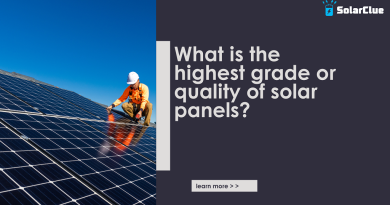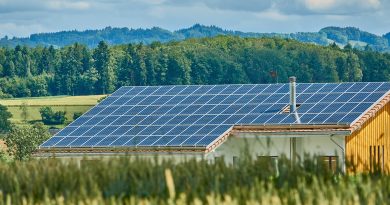Do Solar Panels Affect Property Values?
Solar panels are not only a means to reduce energy bills and carbon footprints but also an investment that can increase the resale value of a home. As environmental consciousness grows and energy costs rise, homebuyers are increasingly interested in properties with solar energy systems. This comprehensive blog post will analyze the impact of solar panels on home resale value, supported by studies and data, and offer practical tips for maximizing the value of a solar panel system when selling a home.
Table of Contents
- 1 The Appeal of Solar Panels to Homebuyers
- 2 Increased Home Value with Solar Panels
- 3 Faster Selling Times for Homes with Solar
- 4 Factors Influencing the Premium for Solar Homes
- 5 Potential Challenges and Misconceptions
- 6 Marketing a Home with Solar Panels
- 7 Transferring Solar Panel Ownership
- 8 The Future of Solar Panels and Home Values
- 9 Case Studies of Successful Solar Home Sales
- 10 Tips for Maximizing the Return on Investment for Solar Panels
- 11 Factors Affecting the Resale Value of Homes with Solar Panels
- 12 FAQ Section
The Appeal of Solar Panels to Homebuyers
Growing Environmental Consciousness:
- Eco-Friendly Living: As awareness of climate change and environmental issues increases, more buyers are looking for eco-friendly homes. Solar panels are a clear indicator of a home’s commitment to sustainability.
- Energy Independence: Solar panels offer the appeal of reduced reliance on grid electricity, which is particularly attractive in areas with high energy costs or frequent outages.
Financial Savings:
- Lower Energy Bills: Homes with solar panels offer the benefit of significantly reduced or even eliminated electricity bills, which is a strong selling point for cost-conscious buyers.
- Long-Term Investment: Buyers see solar panels as a long-term investment that continues to provide financial returns through energy savings over many years.
Increased Home Value with Solar Panels
Studies and Data:
- U.S. Research Findings: A study by the Lawrence Berkeley National Laboratory (LBNL) found that homes with solar panels sold for a premium of approximately $15,000 more than comparable homes without solar.
- Indian Market Trends: In India, the value of homes with solar panels is steadily increasing as more buyers recognize the long-term benefits of reduced energy costs and environmental impact.
Premium Pricing:
- Added Value: The value added by solar panels typically reflects the size of the system, the quality of the installation, and the remaining lifespan of the panels. In regions with higher electricity rates, the premium can be even more significant.
- Energy Performance Certificate (EPC) Ratings: In markets like the UK and EU, homes with higher EPC ratings due to solar installations can command higher prices.
Faster Selling Times for Homes with Solar
Market Demand:
- Quicker Sales: Homes with solar panels often sell faster than those without. According to a Zillow study, U.S. homes with solar energy systems sold on average 20% faster than those without.
- Buyer Preferences: Buyers are increasingly prioritizing energy efficiency and sustainability in their purchasing decisions, leading to quicker sales for homes equipped with solar technology.
Factors Influencing the Premium for Solar Homes
Location:
- High Energy Cost Areas: In regions where electricity prices are high, the savings from solar panels are more pronounced, making the home more attractive to buyers and justifying a higher price.
- Sunlight Availability: Homes in sunny regions can produce more solar energy, further enhancing the appeal and value of the property.
System Quality and Age:
- Newer Systems: Newer solar installations with modern, high-efficiency panels and long warranties are likely to add more value than older systems nearing the end of their useful life.
- Installation Quality: Professionally installed systems with a clean, aesthetic appearance contribute more positively to home value than DIY or poorly executed installations.
Ownership Status:
- Owned vs. Leased Systems: Homes with owned solar panels generally add more value than those with leased systems. Buyers often prefer not to take over a lease, which can complicate the sale process.
Potential Challenges and Misconceptions
Buyer Concerns:
- Maintenance Worries: Some buyers may be concerned about the maintenance requirements of solar panels, despite the fact that they typically require minimal upkeep.
- Roof Integrity: Concerns about the impact of solar panels on roof integrity and the potential costs of removal and reinstallation for roof repairs can deter some buyers.
Misconceptions:
- Cost Misunderstandings: Some buyers may believe that solar panels are only beneficial in regions with abundant sunlight, not realizing that they can be effective even in areas with less sunlight.
- Lease Assumptions: Buyers might incorrectly assume that all solar panels are leased, leading to hesitations about potential long-term obligations.
Marketing a Home with Solar Panels
Highlighting Benefits:
- Energy Savings: Clearly communicate the energy savings the new owner can expect. Provide past utility bills showing reduced electricity costs.
- Environmental Impact: Emphasize the reduced carbon footprint and environmental benefits associated with solar energy.
- Resale Value: Mention studies and data that demonstrate how solar panels increase home value and can lead to faster sales.
Targeting the Right Buyers:
- Eco-Conscious Buyers: Market the home to buyers who prioritize sustainability and green living.
- Cost-Sensitive Buyers: Highlight the financial benefits of reduced energy bills to attract budget-conscious buyers.
Transferring Solar Panel Ownership
Owned Systems:
- Simple Transfer: If the panels are fully owned, transferring ownership is typically straightforward. Provide all relevant documentation, including warranties, maintenance records, and performance data.
Leased Systems:
- Lease Transfer: If the solar panels are leased, ensure that the lease terms are clearly communicated to potential buyers. Work with the leasing company to facilitate a smooth transfer of the lease agreement.
The Future of Solar Panels and Home Values
Growing Adoption:
- Increased Awareness: As more people become aware of the benefits of solar energy, the demand for homes with solar panels is likely to continue increasing.
- Technological Advancements: Improvements in solar technology, such as higher efficiency panels and better storage solutions, will likely enhance the value that solar panels add to a home.
Government Policies:
- Incentives and Regulations: Continued government incentives, such as tax credits and rebates, will support the adoption of solar energy and potentially increase the premium for solar-equipped homes.
Case Studies of Successful Solar Home Sales
Case Study 1: Solar Home in California:
- Location: Los Angeles, CA
- Outcome: A 4-bedroom home with a 6 kW solar system sold for $20,000 above the asking price, with multiple offers received within the first week.
- Key Factors: High electricity rates in California, high-quality solar installation, and clear communication of energy savings.
Case Study 2: Solar Home in Pune, India:
- Location: Pune, Maharashtra
- Outcome: A 3-bedroom home with a 5 kW solar system sold 15% faster than comparable homes in the area, with a 10% premium on the sale price.
- Key Factors: Rising energy costs in India, growing environmental consciousness, and government incentives.
Tips for Maximizing the Return on Investment for Solar Panels
1. Choose High-Quality Panels and Inverters:
- Higher Efficiency: Invest in high-efficiency solar panels that maximize energy production.
- Reliable Inverters: Choose inverters with strong warranties and reliable performance, as they are crucial to the system’s overall efficiency.
2. Maintain the System Regularly:
- Cleaning: Regularly clean the panels to ensure they operate at maximum efficiency.
- Monitor Performance: Use monitoring systems to track the performance of your solar panels and address any issues promptly.
3. Keep Detailed Documentation:
- Maintenance Records: Keep detailed records of all maintenance and performance checks.
- Warranty Information: Ensure that all warranty documents are available and transferrable to the new owner.
4. Highlight Financial and Environmental Benefits:
- Utility Bills: Show potential buyers past utility bills that demonstrate the cost savings achieved with solar panels.
- Environmental Impact: Emphasize the reduction in carbon emissions and the home’s contribution to sustainability.
5. Consider Timing Your Sale:
- Peak Seasons: Selling your home during peak real estate seasons can help attract more buyers and maximize the value of your solar panels.
- Market Conditions: Monitor the real estate market and consider selling when demand for energy-efficient homes is high.
Factors Affecting the Resale Value of Homes with Solar Panels
| Factor | Impact on Resale Value |
|---|---|
| System Ownership | Owned systems add more value than leased systems |
| System Age | Newer systems with long warranties increase home value |
| System Quality | High-quality installations enhance appeal and value |
| Location | Higher impact in areas with high electricity costs and ample sunlight |
| Energy Savings | Demonstrable energy savings increase buyer interest |
| Government Incentives | Available incentives can enhance the attractiveness of solar homes |
FAQ Section
1. Do solar panels really increase home value?
Yes, multiple studies have shown that homes with solar panels typically sell for a premium compared to similar homes without solar installations.
2. Can solar panels make my home sell faster?
Homes with solar panels often sell faster, particularly in markets where buyers prioritize energy efficiency and sustainability.
3. What challenges might I face when selling a home with solar panels?
Potential challenges include concerns about maintenance, roof integrity, and the transfer of leased solar panels. Properly addressing these concerns and providing clear information can help mitigate them.
4. How much of a premium can I expect when selling a home with solar panels?
The premium varies based on factors like location, system size, and the quality of the installation. On average, homes with solar panels can sell for 3-4% more than comparable homes without solar.


